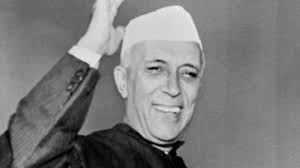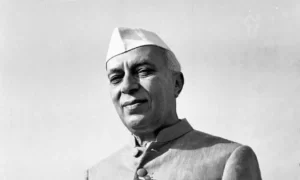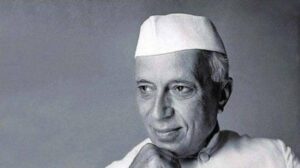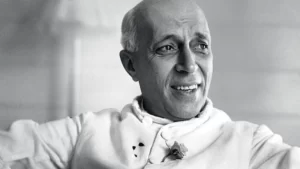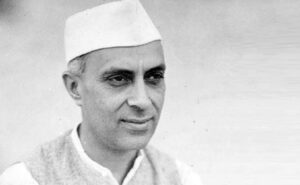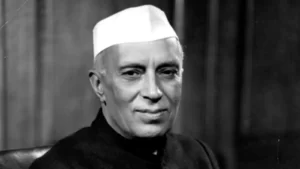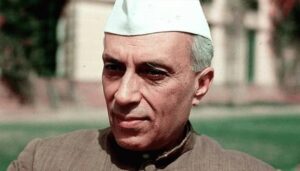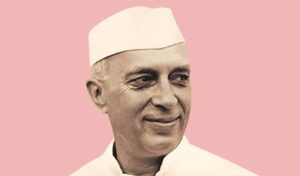The Basic Objectives
Whether we like it or not, a high destiny has caught us in its grip. We may master it and shape it to our will, or fail and prove ourselves false to the opportunity that came to us.
The whole object of development of a country is social welfare in its wider sense and not merely in the sense of aiding the physically handicapped and the weaklings in a society.
Obviously, we could not consider any problem, much less plan. without some definite aim and social objective. That aim was declared to be to ensure an adequate standard of living for the masses, in other words, to get rid of the appalling poverty of the people. This included the rich and the poor, town dweller, and the villager. In view of the great gulf between the rich and the poor and the concentration of wealth in the hands of a few, the average income of the villager was estimated to be far less.
The real problems for me remain problems of individual and social life, of harmonious living, of a proper balancing of an individual’s inner and outer life, of an adjustment of the relations between individuals and between groups, of a continuous becoming some thing better and higher, of social development, of the ceaseless adventure of man.
The basic need of 99 per cent of the masses in India is enough food, cloth and houses. Besides, there should be adequate provision for education, health and employment. People can solve problems, not with slogans but with planning.
These called for planning on a national scale, encompassing all aspects of economic and social life, for efforts to mobilise resources, to determine priorities and goals and to create a widespread outlook of change and technological progress
Thus, planned development was the means for securing with- the utmost speed possible, a high rate of growth, reconstructing the institutions of economic and social life and harnessing the energies of the people to the tasks of national development.
The leading features of the pattern of development envisaged in the Five Year Plans may be briefly stated. The basic objective is to provide sound foundations for sustained economic growth, for increasing opportunities for gainful employment and improving living standards and working conditions for the masses. In the scheme of development, the first priority necessarily belongs to agriculture and agricultural production.
So far as overall planning goes. India has a great plan but we have lagged behind in its implementation. Mere eloquence in discussion and resolutions is not enough. What is required is a certain dynamism, Creativity.
Disparities in levels of development in different regions have to be steadily reduced and the benefits of industrialisation spread evenly between different parts of the country.
You know how attached I am to the concept of planning.
What is planning? Planning is the application of your intellect to a logical, reasonable and better way of doing things. It passes my understanding how any person with a grain of intelligence can object to planning, because such an objection amounts to objecting to an intelligent approach to things. Whether it is in economics or politics, or anything else, planning is essential.
Planning means thinking of the future.
Town Planning is becoming more and more important in India, not only planning of great cities like Delhi or Calcutta, which is very important, but smaller cities and smaller towns.
What is all our planning for?
It aims at improving the standards of living of the people and strengthening the country in various ways. Some people may think that the first object of the state is to make the country militarily strong. That is not our objective. Although we want the country to be strong, ultimately, all this should result in raising the social and other standards of all the people.
The whole purpose of planning is not to disperse effort in this way: (but) to concentrate it on worthwhile things. It is difficult to pick and choose.
Planning is essential because otherwise we waste our resources which are very limited. Planning does not mean a collection of projects or schemes but a thought-out approach of how to streng then the base and pace of progress so that the community advances on all fronts.
In planning, especially, this sensation has to be created so that the people may feel that the plan is something that has been evolved with their co-operation and that they are responsible for its success.
Planning is essentially a process whereby we stop those cumulative forces at work which make the poor poorer, and start a new series of cumulative forces which make them get over that difficulty. We have to plan at both ends. We have to stop the cumulative forces which make the rich richer and we have to start the cumulative forces which enable the poor to get over the barrier of poverty. In Russia this was done, but at terrific cost in human suffering. The problem which we have to face is how to cross the barrier of poverty without paying that terrible cost and without infringing on individual freedom.
5
We have said that our objective is a socialistic pattern of society. I do not propose to define precisely what socialism means in this context because we wish to avoid any rigid or doctrinaire thinking. Even in my life I have seen the world change so much that I do not want to confine my mind to any rigid dogma.
in planning, especially, we are apt to forget the larger perspective and lose ourselves in some particular aspect which is of importance and yet which may very well come in the way of the larger perspective. For example, take the question of regional development.
Perspectives (Long Range & Short Range)
A national plan has thus both a short-term objective and a long-term objective. The long-term objective gives a true perspective. Without it short-term planning is of little avail and will lead us into blind alleys. Planning will always be perspective planning and will be hard in view of the physical achievements for which we strive. In other words, it has to be physical planning, though it is obviously limited and conditioned by financial resources and economic conditions.
Planning is a continuous movement, towards desired goals and because of this, all major decisions have to be made by agencies informed of these goals and the social purpose behind them. Even in considering a five-year period. forward and long-term planning has always to be kept in view. Indeed, perspective planning is the essence of the planning process. As this process develops, there is a certain rhythm of expansion in the development of the people, and a sense of enterprise and achievement comes to them. They are conscious of a purpose in life and have a feeling of being participants in the making of history.
Ultimately, it is the development of the human being and the human personality that counts. Although planning involves material invest ment, even more important is the investment in man.
As a first step, it should provide for the basic necessities, in particular. for food, work, opportunity for education, reasonable conditions of health and sanitation, improvement in conditions of housing and a minimum level of income which, in the given circumstances, will ensure tolerable living standards.
We are all agreed that disparities, not only as between individuals in regard to income, but as between the various areas in India, should be removed, that there should be equality of growth and opportun ity all over India. But, if we start applying that principle regardless of the other objectives and perspectives, we may spoil the whole Plan. We may not have very much to give to any region. Therefore, in looking at the Five-year Plan, we have to think really of several Five-Year Plans. That is why it is becoming more and more important that we should, in addition to the period we are dealing with, have a longer perspective in view.
These five years are only some kind of a period that we fix for our convenience, because there are no isolated periods in the march of a nation. It is a continuous march. We must really think in terms of even longer periods and in terms of several Five-Year Plans. This is the second. Nobody thinks that at the end of the Second Plan we shall have been at the end of our journey.
Planning now means not only producing something livable but possibly doing away with many of the difficulties and dangers that may come later. You must think of that. You must build for the future.
It is always important to do a thing in the right way. Indeed how one does anything is as important as the thing itself. If in our attempt to solve a problem we create half a dozen new problems.. we have not acted very wisely. Therefore, let us pay heed to the manner of doing it and avoid anything that leads to future difficulty.
Planning Paradoxes
In India we have a terrible problem of extreme poverty in certain large regions, apart from the general poverty of the country. We have always a difficult choice before us: whether to concentrate on production by itself in selected and favourable areas, thus for the moment rather ignoring the poor areas, or try to develop the backward areas at the same time so as to lessen the inequalities between regions. A balance has to be struck and an integrated national plan evolved.
The Five Year Plans provide for a comprehensive and many-sided effort to transform the peasant’s outlook and environment. The growth of agriculture and the development of human resources alike hinge upon the advance made by industry. Not only does industry provide the new tools, but it begins to change the mental outlook of the peasant.
Land reforms have a peculiar significance because without them. more especially in a highly congested country like India, there can be no radical improvement in productivity in agriculture But the main object of land reforms is a deeper one. They are meant to break up the old class structure of a society that is stagnant.
Frequently, in the early phases of development, there is a dilemma to be faced: whether it is better to concentrate on developing more favourably situated areas and thus securing quicker and larger) returns from the investment, or to aim at more even development of the country, through greater attention to the more backward areas. Economic considerations have necessarily to be given importance, but certain social and regional aspects cannot be ignored. Indeed, as the economy develops, it becomes possible to provide for more intensive development in the less developed areas.
India’s social structure already presented numerous inherent con flicts and barriers to economic advance. While some of the old distinctions are passing a process which is being speeded up-ur banisation and the growth of modern industry tend to introduce new disparities in levels of income and opportunity. In turn, these are reflected in modes of living, social behaviour and a general increase in the spirit of acquisitiveness. It is the aim of public policy to check undesirable tendencies and to ensure that these do not come in the way of building up a society which is fundamentally integrated from within and derives its strength from common values and a sense of shared citizenship.
Difficulties and delays arise in implementation, and we may not succeed to the extent we aimed at. But I believe we are gradually moving in that direction.
Nevertheless, we cannot just disrupt and hope for something better without having some vision of the future we are working for however vague that vision may be.
But I know that it is essential to have some institutions. Otherwise, it is just a chaos.
5
You have to think of what you want your towns and villages to be like, so that gradually you may approach the ideal. You cannot accomplish it quickly.
Planning is full of dilemmas. At every step we have to choose between this or that and we have to find some middle way.
The speed of change in a democracy is obviously somewhat slower, the processes are slower than in an autocratic or authoritarian regime. That’s true. But to bring about any vital change in the life of a nation takes time.
Take the changes in the Soviet Union. Even there… After all, it is thirty-eight years since the Revolution and they had to work very hard, and they had a fully authoritarian regime. They could almost do what they like-within limits and yet they had to work hard for it. The changes did not come off suddenly. The Revolution came off suddenly, no doubt, but the process of building up takes time, whatever has happened previously.
I am prepared to agree that an authoritarian regime may take less time. But I think that the difference in time is not so great as people imagine. It need not be provided the people of the democratic country are eager enough for change and are prepared to work for it.


